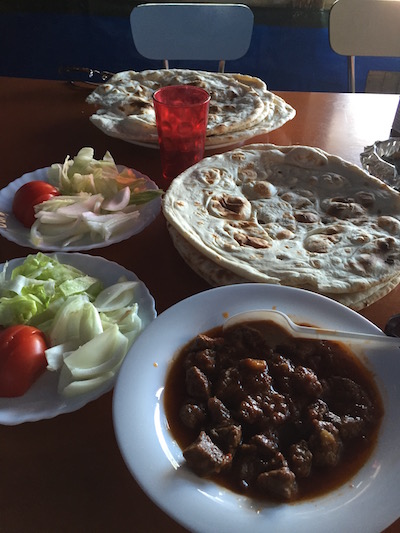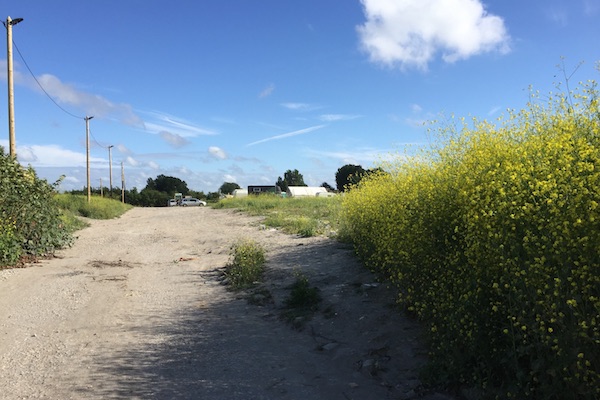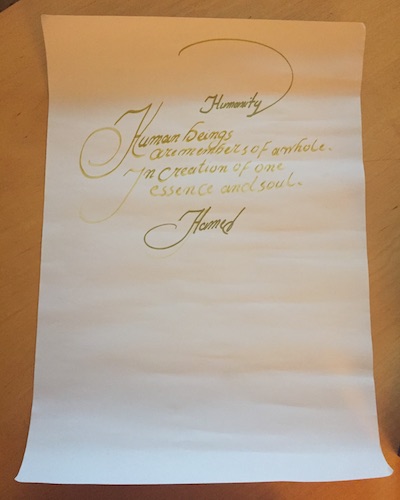While I enjoyed working at the Help Refugees warehouse, my goal was to get on the distribution team. Hettie had deemed my language skills “invaluable,” yet she couldn’t find room for me on the distribution team. It may have had something to do with the fact that I was only there for a week.
- My Observations of the Calais Jungle
- Calais Diaries: Day 1 at the Help Refugees Warehouse
- Lost in the Calais Jungle
- Saucepans, Jungle Books and a Conversation with a Weirdo
- That Time I Got Yelled at By One of the Refugees
- Banksy’s Mural and the American Living in the Calais Jungle
On Day 3, I came in late after spending the morning doing laundry. Hettie spotted me and exclaimed, “Where were you!? I’ve got a spot for you on distribution!” She instructed me to see James, who was the leader of the distribution team. He was the polar opposite of Hettie – quiet, low-energy, and a bit lethargic.
James said he’d find me at noon and put me through orientation. Of course, he didn’t and when I went to look for him someone said he’d gone to camp. The next day, there was no one to put me through orientation, so I decided to sneak in.
Sneaking into the Calais Jungle
An instructor at the elementary school had invited me to come by that afternoon to help her teach. Max was driving a few people to camp, so I hitched a ride with him. James spotted me and said since I hadn’t attended orientation, I couldn’t work on distribution.
Rather than tell him I was going into camp on my own (a huge no-no), I played dumb and told him I thought coming along would be my orientation. He was nice about it and said I would just have to watch since I hadn’t been trained.
We were lead to “Majid’s house.” Majid was a 26 year-old Afghan refugee from Jalalabad who lived in a makeshift hut with his friends. The team used his backyard to distribute clothes out of a small booth.
To make the process as dignified as possible, refugees were asked what clothing item they needed and which size they preferred. Three items were then held up and they were allowed to choose one.
We settled around a table surrounded by upholstered benches, enjoying tea and Jalebi. I immediately noticed a caucasian girl wearing a long Afghan-style shirt and loose scarf, speaking Farsi.
When she spotted me, she greeted me in Farsi – probably because I was wearing a headscarf and she assumed I was Iranian. We began speaking in our varying dialects and I learned she became fluent in Farsi after spending several years living in Iran.
Our conversation caught the attention of two volunteers sitting nearby – James and Millie from the UK. They became curious about my ability to speak Dari, so we chatted until James (the distribution leader) informed us we’d missed lunch at the warehouse and should grab a bite to eat at one of the camp restaurants before heading back.
Lunch at the New Kabul Restaurant
James, Millie and I walked to the New Kabul Restaurant after hearing about the amazing chicken korma. The owner stood near the door, by a canister stove where three pots were fired up. To the right were two tables: One was occupied by three Afghan teenagers, so we took the table by the window.
We ordered two chicken and one beef korma. There was no more rice, but we could substitute them for beans, which we declined.
The restaurant owner brought us each a plate of salad and three pieces of tandoori bread. Everything tasted fresh and the place was very clean.
James and I talked about the Afghan-Soviet War and I was surprised at how much this recent college graduate knew about the subject. He was fascinated with the mujahideen’s military strategy, so I recommended he read Afghan Guerrilla Warfare: In the Words of the Mjuahideen Fighters by Ali Ahmad Jalali.
I also chatted with the store owner, whom I’d read about in a news article several months back. He and his business partners walked three hours every day for the supplies they needed to run the restaurant. They split the profits, which amounted to around $100 per day, three ways.
I don’t know where the man ended up post evacuation, but he could cook a mean korma. When it came time to pay, he refused to take my money, calling me his guest. Finally, after I insisted, he said the meal was $5 per person.
Shortly after this, I met Amelia, who worked with vulnerable populations in the Calais Jungle. After hearing that I spoke Pashto, she expressed interest in getting me on the team. She took my number and asked me to join the team briefing the following morning.
An Unaccompanied Minor in the Calais Jungle
While we ate at the New Kabul Restaurant, a young boy came in and sat by the door. We’ll call him Sulaiman. He was a good-natured 12 year-old from Laghman, Afghanistan.
I asked if he was in Calais with his parents and he shook his head, smiled and said “No. I came here with a few boys from my town”. Both he and the store owner seemed amused by my stunned reaction.
Sulaiman told me he had tried to board a ferry to the UK that morning. The authorities consequently caught him, pulled him off the boat, tear gassed him and roughed him up. He seemed to be taking it in stride and said he would keep trying until he crossed over to the UK. When I asked him what he was going to do when he got there, he shrugged with a smile and said, “I’ll figure it out when I get there”.
The next day while I was sitting in the warehouse, Sulaiman walked in with Liz Clegg, the woman in charge of the Unofficial Women and Children’s Center. I spoke to them both and found out he actually wasn’t on his own. His 9 year-old brother was with him in Calais.
It broke my heart when I tried to give him some clothes, per Liz’s request, and he said with the most desperate look on his face: “I don’t need shoes or clothes. Can you please just help me get to London somehow?” Several weeks later, I was happy when Liz reported that Sulaiman had safely made it to the UK.
More Volunteer Opportunities
Outside of the restaurant, we ran into Tom and Chloe, two British volunteers who had been in Calais for several months. They worked with the Welcome Wagon and helped build shelters for the refugees.
When Amelia mentioned that I was fluent in Pashto and Dari, they declared I was coming with them. They needed someone at the Welcome Wagon to communicate with newly arrived refugees, which I was happy to do.
We walked to an area inhabited by Sudanese refugees. Tom discovered this sector following an evacuation. He and Chloe proceeded to relocate people there. The way he spoke about the tented area was how a real estate agent might describe a highly desirable neighborhood.
Tom had spent eight months in Calais and when I asked what his family thought of him being here, he said they missed him but were proud of the work he was doing.
Chloe noticed that some of the residents had piled sand around their tents in order to fortify them. She tried to convey to them that this would actually damage the tents and walked around saying, “Muchas mushkalat!” – her attempts at saying “major problem” in Arabic.
The Calais Jungle Welcome Wagon
The Calais Jungle Welcome Wagon was where newly arrived refugees got essentials for their first night. However, that afternoon, it served as a distribution point for blankets. A few of the refugees seemed confused by a sign informing them of the Dublin Regulation, so I stepped in to explain it.
Following an announcement that there were no more blankets left, two Afghan guys approached me. They had arrived the night before and never got theirs. Calais got pretty cold at night, so I asked Tom if he could help.
Valentino stuck his head out of the trailer and said coldly, “No. They’re supposed to line up at four”. I explained this to the guys and apparently another volunteer had instructed them to come at five. I relayed this to Valentino who said, “We changed it. Come back tomorrow at four”. The guys finally left, with nobody caring that they would be sleeping in the cold that night.
Tom then introduced me to Valentino, emphasizing my language skills. Valentino stared blankly and said, “We don’t need more people”. Tom seemed disappointed but didn’t argue. I spent some time speaking with an elderly British woman, who recounted the occasional ruckus caused by the Dublin Regulation sign.
A few days before, one of the refugees freaked out about the possibility of being deported and begged her to marry him. Many of the young girls received marriage proposals regularly, but this was the first time she, a woman in her 60’s, had received one.
A Momento from Jungle Books
At Jungle Books that evening, the usual crowd was present. Most of them were studying or engaging in chit chat while smoking cigarettes that they bought from the Eritreans at a cost of 1 Euro per 10.
I have no idea what these cigarettes were made of, but I was told it wasn’t tobacco – figures, since they were so ridiculously cheap. Days later, the second hand smoke from these cigarettes actually made me lose my voice.
Most of the residents cooked their own meals, so I was often invited to dinner or they offered to bring me food. I also got a nice surprise from a 19 year-old named Hamed, whom I had met on my first day at Jungle Books. Hamed was fond of calligraphy and on this particular day, he presented me with this:
It was such a beautiful gesture that I vowed to frame it when I got home. Unfortunately, as I was moving from one hotel room to another, I somehow lost it. I was sure I rolled it up and put it into the front pocket of my carry-on, but it wasn’t there. I’m glad I at least have a photo of it…
[jetpack_subscription_form title=”Subscribe via email for more points, miles and free travel”]



I’ve enjoyed reading all of your posts about the Jungle. I meant to tell you earlier that I’m impressed you volunteered. I’ve done similar things in my life and your posts inspire me to volunteer again. Thank you.
Thanks Rob. I’m glad you enjoyed following along.